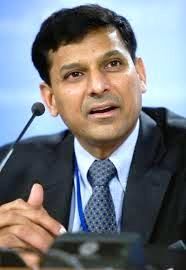Would it matter if Mr Rajan had applied for US citizenship or was, in fact, a US citizen? After all, he manifestly spent much of his adult life there and it is his deep knowledge of global financial systems developed there that interested the Indian government for his current role, rues Kanika Datta.
 Raghuram Rajan did not have to hold up for public scrutiny his passport proving his Indian citizenship the way half-Kenyan US President Barack Obama had to display his birth certificate to prove to persistent doubters that he was born in the US.
Raghuram Rajan did not have to hold up for public scrutiny his passport proving his Indian citizenship the way half-Kenyan US President Barack Obama had to display his birth certificate to prove to persistent doubters that he was born in the US.
The Reserve Bank governor had already submitted a copy of his passport to the Lok Sabha Speaker in August after Bharatiya Janata Party member of Parliament Murli Manohar Joshi had raised a calling attention motion to the question of his citizenship.
To be sure, there is a distinction in the two examples. Mr Rajan would not have broken any rules had he not been an Indian citizen.
Mr Obama, on the other hand, had to be born in an American state since only natural-born citizens are eligible to run for the White House (a fact the ambitious German-born former US Secretary of State Henry Kissinger often rued).
But it is uncertain whether Mr Rajan’s justifiably irate answer -- apparently he regularly receives mails on the issue -- allayed the suspicions of the Indian Birthers.
Still, his reply was interesting because it points to bigger questions embedded in a controversy that erupts every so often as India increasingly plugs into a globalised world.
He had always been an Indian citizen and had never applied for the citizenship of or taken a pledge of allegiance to another country, he said.
Would it matter if Mr Rajan had applied for US citizenship or was, in fact, a US citizen?
After all, he manifestly spent much of his adult life there and it is his deep knowledge of global financial systems developed there that interested the Indian government for his current role.
Plus, he holds a green card. He is technically correct when he says this is just a work permit.
But a green card holder has to file tax returns in the US and is eligible for US social security services.
In short, he enjoys the benefits of US citizenship without too many of its burdens (one reason the green card is so beloved of matrimonial ads).
It is ironical a member of Parliament from Bharatiya Janata Party should have raised the issue because this party lobbied hard for dual citizenship for its vast diaspora of staunch supporters.
Thanks to a creation for which it was largely responsible when in power -- the Pravasi Bharatiya Divas -- in 2003, people of Indian origin who either live overseas or spend a good part of their time there enjoy far more rights in India than before.
Non-resident Indians are now allowed to vote (the dampener being that they must be in situ to do so).
If Mr Rajan’s citizenship is considered relevant for heading an organisation that issues sovereign currency, should the provenance of a participant in a critical function of a sovereign democracy not count as well?
And though the government does not allow dual citizenship in the strict sense, it has created a hybrid creature called the overseas Indian citizen.
This confers on overseas citizens of Indian origin something like a lifetime India visa.
An OIC, thus, enjoys almost all the benefits of an NRI, barring the right to acquire agricultural land, vote and hold public office. Not that this last restriction bothers anyone.
It is corporations, especially multinationals, that reap the benefits of hiring talented OICs with global exposure and knowledge and multiple-entry visas.
The corporate sector, with its hard-nosed practicality, knows how to latch on to a good thing -- one reason the PBD gatherings are partly organised by the industry lobbies.
It is the government that allows itself to be bogged down.
The Bank of England, central bank for an economy slightly larger than India’s, appears to have no qualms about hiring a Canadian to head it.
Why, Her Majesty’s Revenue and Customs saw no constraint to leveraging the formidable knowledge of the Indian economist Parthasarathi Shome, currently advisor to the finance minister, as its chief economist as recently as 2008.
So why the reservations in India?
The sophisticated argument is that India’s self-confidence as a nation is not yet evolved --it’s the same defensiveness that precludes the kind of politically incorrect humour of a Jay Leno Show or the Blackadder series.
The Birthers say it’s all to do with ‘patriotism’.
Thus, in the storm of protest around Sonia Gandhi, an Indian citizen of Italian origin, being appointed prime minister, some bright spark in the BJP raised the issue of Alberto Fujimori, the Peruvian president of Japanese descent who was jailed for corruption and human rights abuse.
This sort of linkage is scarcely credible, given the number of South American dictators of decidedly local origin who have done far worse to their countries.
Anyone remember Chile’s Augusto Pinochet.
And it was Ms Gandhi’s entirely Indian mother-in-law who was responsible for the biggest subversion of Indian democracy to date.
Foreigners run Indian-owned airlines, car companies, consumer corporations and telecom utilities without any noticeable threat to national security or questions about ‘patriotism’.
Many Indians and people of Indian origin do likewise in global corporations and foreign governments -- and we fete them.
So what is wrong with hiring the best talent available globally for -- at the very least -- our regulatory organisations whether they are Indian or not?
Image: Raghuram Rajan












 © 2025
© 2025